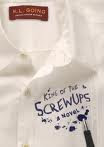
Did you ever feel like people don't really listen when you talk? don't understand the real you? don't appreciate your talents or recognize what you can do? If you've ever felt slighted, or slotted into a category of "type of person" that no longer fits, you will definitely recognize the character of Frankie Landau-Banks. Her family calls her "Bunny Rabbit," which sounds cute and powerless, right? Well, Frankie no longer wants to be seen as powerless. She wants people to recognize her intelligence and creativity -- and she wants to be a full player in whatever activities she finds interesting. She has no interest in dabbling in things that boys don't bother doing, such as field hockey or decorating the gym for the dance. In short, she is this generation's embodiment of women's lib!
After a summer in which her body suddenly develops, she returns for her sophomore year at Alabaster, an exclusive and challenging private boarding school. She catches the attention of one of the most popular senior boys, Matthew, and she's happy because she's had her eye on HIM for a year. After they start to date, she discovers that he leads a secret life as a leader of a secret male society to which she had heard her dad and his business associates, also alumni of Alabaster, allude during a summer dinnertime restaurant meal. She tries to get Matthew to tell her more about this society - but he acts like he doesn't know what she's talking about, and tries to change the subject to inconsequential topics, or tries to distract her by making out.
Well, even though she likes to make out with him, she is hurt and angry that he doesn't think she's "worthy" of knowing about his stupid club -- so she creates an anonymous email account pretending to be Matthew's co-leader (aka Alpha Dog) and orchestrates a series of outlandish pranks and public protests for the club to carry out. And thus begins her "disreputable history."
Many young adult books try to describe their main characters in ways that make them familiar. A trend lately has been to use slangy language, and to describe the traumas and the social life (i.e. parties, dating, emotional and physical challenges, etc.) of the girls, especially. One reason I loved this book was that it recognizes the depth and diversity of teens -- not EVERYone spends all their time figuring out their love life, or dealing with family issues such as alcoholism or eating disorders. Most kids have geometry tests, play Monopoly, have friends who like things other than just sports and popularity (some play chess, or are in the band, or set up AV equipment at school). They all might be trying to figure out who they are, what they want to be, and what matters to them. But just as Frankie objected to being slotted as a "type," many young adult novels also slot all teenagers as a "type."
Another fun aspect of this book was how Frankie played with language. She made up words based on the extension of the rule of non-positives. If INflexible means "not flexible," and DISjointed means "not jointed," then what do you do with words like Disgruntled? Is "gruntled" a word? (not gruntled) Frankie thinks it should be, and she soon starts to pepper her conversations with these words, which catches the reader's attention and reminds us of her new game.
For the rich character development, the suspenseful story line (will she get caught and revealed as the mastermind (or should it be "mistress-mind?) of the pranks), and for the intelligent vocabulary, I give this book
4 out of 4 stars.













 Jerk, California
Jerk, California










